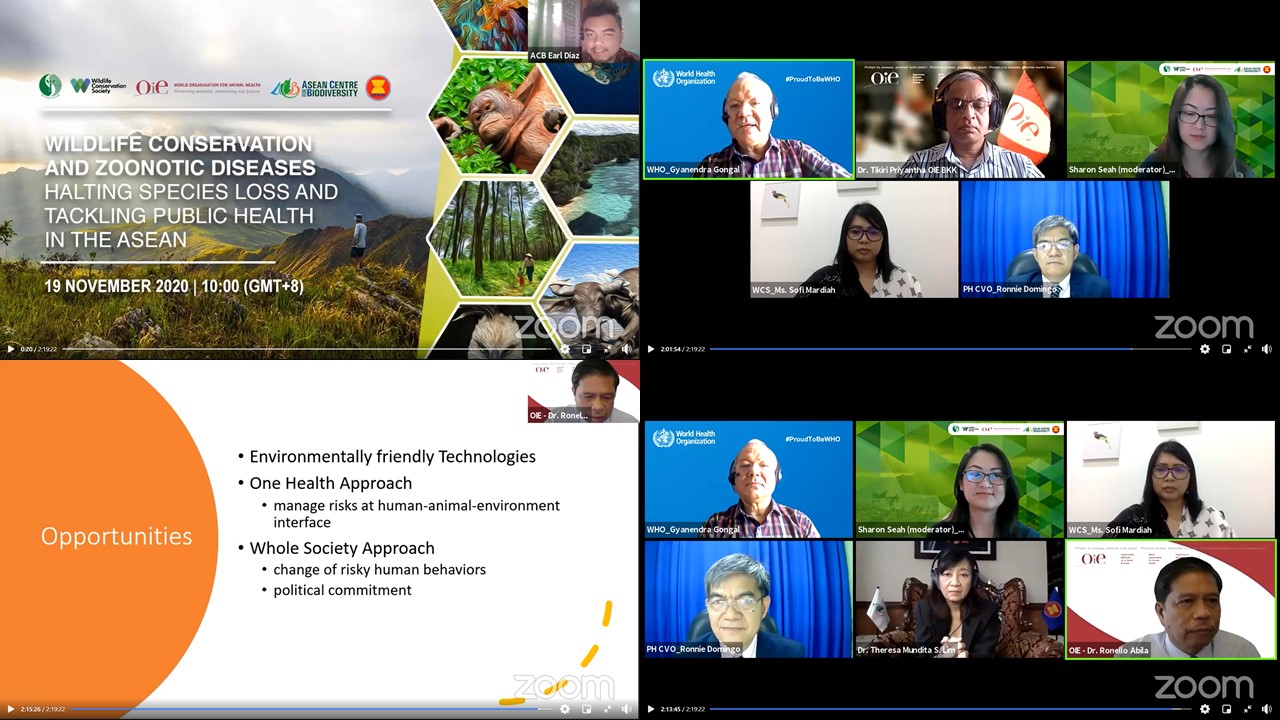The ASEAN Centre for Biodiversity (ACB), in collaboration with Viet Nam Ministry of Natural Resources and Environment, the ASEAN Secretariat, the World Organization for Animal Health (OIE) and the Wildlife Conservation Society (WCS) organized the webinar with a focus of wildlife conservation and animal health linkage to zoonotic diseases spread and prevention as well as preparedness for the future with a One Health approach. ACB is an intergovernmental organization that facilitates cooperation and coordination among the ten ASEAN Member States (AMS) and with regional and international organizations on the conservation and sustainable use of biological diversity. The webinar was held on November 19, 2020 at 9.00 am Bangkok time. The main objectives of the webinar were to inform the relevant ASEAN Sectoral Bodies and other relevant stakeholders on the issues between animal and human health, wildlife habitat protection, wildlife trade, using the One Health approach.
The webinar was opened with the welcome remarks of H. E. Kung Phoak, Deputy Secretary General of ASEAN Sociocultural Community, followed by the welcome remarks of Dr Nguyen Van Tai, Chairperson of ASEAN Senior Officials on the Environment and the Director General of Viet Nam’s Environment Administration of the Ministry of Natural Resources and Environment.
In the webinar, the drivers of emergence of zoonoses were highlighted, noting the complex links emphasising the need to address the issue with more coordinated actions. As a high biodiversity region, importance of elevated action on biodiversity agenda in the region through OH approach, engagement of the communities and the importance of changing the risk behaviours, importance of scaling up investments on biodiversity and engagement of the private sector were discussed as important methods to address the issue. Southeast Asia that shows a high growth in livestock production and meat consumption in response to the rising incomes, growing population, and increasing urbanization. Accordingly, mass movement of humans and animals, intensified animal production, changing production systems, growing population, ecological dislocation, and climate changes have become important factors influencing the emergence of zoonotic diseases. It was envisaged that interventions with a One Health focus can address the issues in concern holistically. Importance of enhanced disease surveillance, early diagnosis and inter-sectoral collaboration, strengthening policy and institutional framework, strengthening pandemic prevention through “One Health” approach and reducing consumer demand for wild animal meat through behaviour change of consumers (BCC) approach were underlined as approaches to mitigate the emergence of zoonotic diseases.
OIE made a presentation entitled “One Health Approach: Strengthening multi-sectoral collaboration and efforts in addressing COVID-19” that discussed the Tripartite One Health approach, new tools related to the COVID-19 emergency and OIE Wildlife activities and Impact of COVID-19 in driving future work programmes at the OIE. Under Tripartite activities, OIE’s engagement since 2010 at global and regional level was explained including the IHR/PVS bridging workshops at country level. Ongoing pandemic, as a key area that the webinar was focused on, the new tools OIE has developed to support the fight against COVID-19 was explained giving the examples of involvement of animal health laboratories in diagnosing the disease as a support to the public health services. Availability of appropriate tools to manage the issues of human-animal-eco system interface can be considered as a need of the current time more than ever. In that context, proposed OIE wildlife health management framework, that has the overall objective to pre-empt, reduce and manage the risk of spill over events of pathogens between wildlife, domestic animals and humans at the human-animal-ecosystem interface was introduced as an appropriate tool to be used in the future.
The webinar was concluded with the closing remarks of Dr Ronello C Abila, Sub-Regional Representative of OIE SRR SEA. In concluding remarks, Dr Abila classified challenges, under, climate change and anthropogenic while identifying environmentally friendly technologies, One Health approach and whole society approach as opportunities. Also emphasised the requirement of ensuring the earth with less zoonotic diseases to preserve the future.
